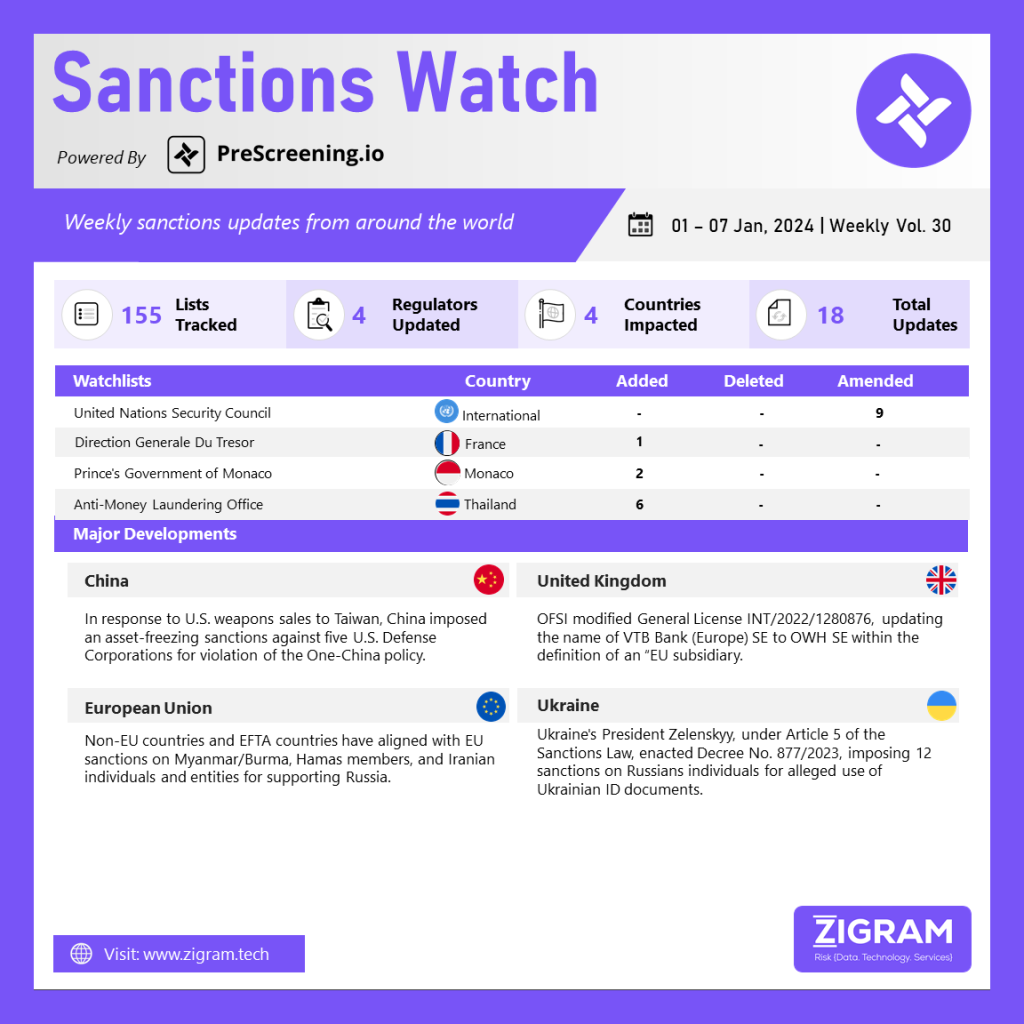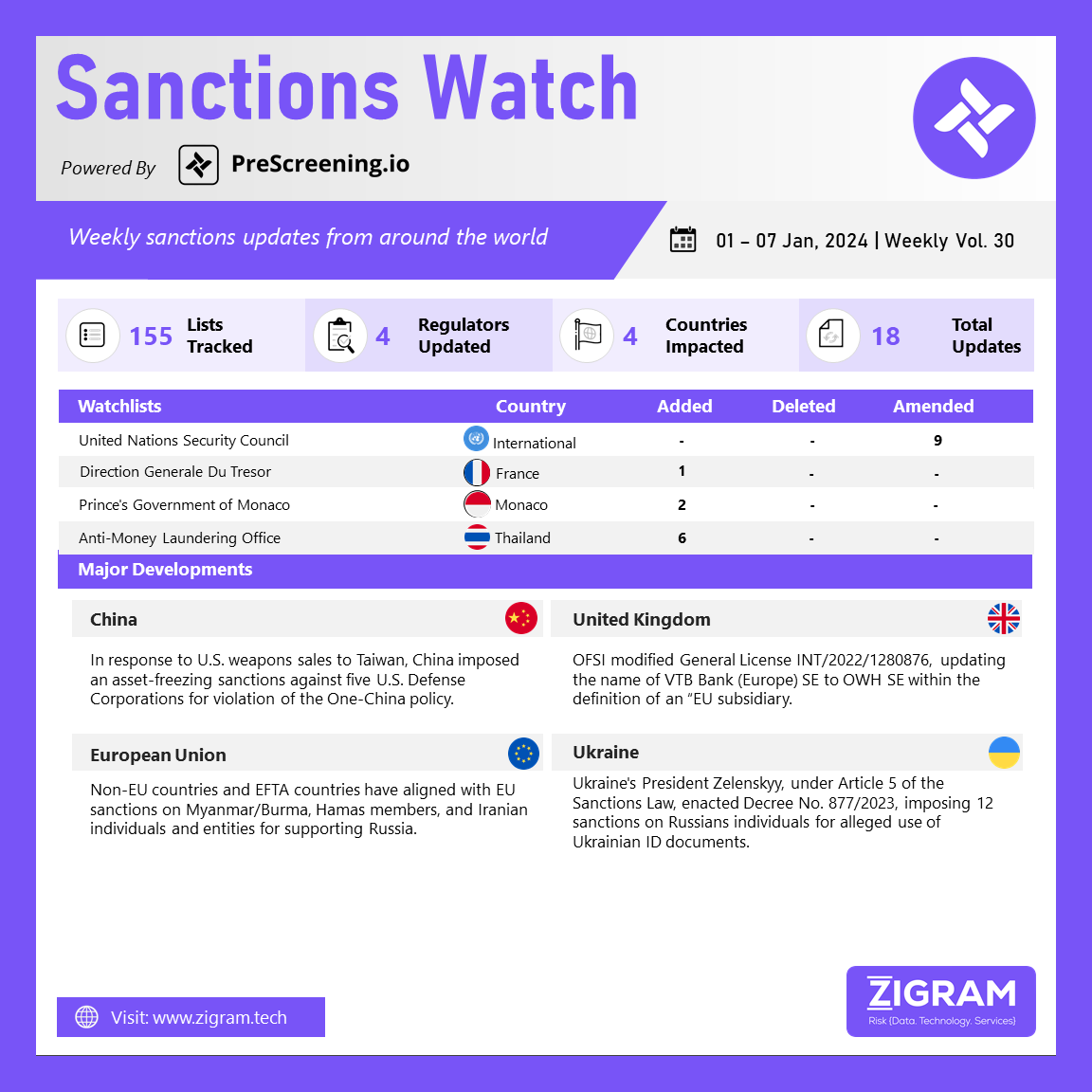Published Date:
In the latest edition of our Sanctions Watch weekly digest, we present significant updates on sanction watchlists and regulatory developments.
China imposed sanctions on five American defense companies as a response to U.S. arms sales to Taiwan and previous United States sanctions on Chinese entities. The sanctions involve freezing the companies’ assets in China and prohibiting Chinese organizations and individuals from engaging in business with them, as outlined by the Foreign Ministry in an online statement. This move coincides with the approaching presidential election in Taiwan, where the management of relations with China is a pivotal issue. While the specific U.S. arms deal triggering this action wasn’t detailed, it follows China’s warning three weeks ago of countermeasures in response to the U.S. government’s approval of a $300 million military package for Taiwan in December. The approved package encompasses equipment, training, and repairs to sustain Taiwan’s command, control, and military communications capabilities.
The Office of Financial Sanctions Implementation (OFSI) amended General License INT/2022/1280876 to change the name of VTB Bank (Europe) SE to OWH SE within the definition of a “European Union (EU) subsidiary.” European Union (EU) subsidiary Means OWH SE (previously known as VTB Bank (Europe) SE) and any entity owned or controlled by OWH SE incorporated in Germany.
The candidate countries, including North Macedonia, Montenegro, Serbia, Albania, Ukraine, Moldova, Bosnia and Herzegovina, and Georgia, along with European Free Trade Association (EFTA) countries Liechtenstein, Norway, and Armenia, have voluntarily aligned with the European Union‘s designations related to Myanmar/Burma. Additionally, candidate countries North Macedonia, Montenegro, Serbia, Albania, Ukraine, Moldova, Bosnia and Herzegovina, and EFTA countries Iceland and Liechtenstein have synchronized with the EU’s decision to designate two Hamas members as terrorists. Furthermore, candidate countries North Macedonia, Montenegro, Albania, Ukraine, Moldova, Bosnia and Herzegovina, and EFTA countries Iceland, Liechtenstein, and Norway have aligned with the EU’s decision to designate Iranian individuals and entities based on alleged support for Russia.
By Article 5 of the Law of Ukraine “On Sanctions,” President Volodymyr Zelensky has taken decisive action by enacting Presidential Decree No. 877/2023. This decree specifically targets six Russian individuals accused of utilizing Ukrainian ID documents for illicit purposes. The consequences for the designated individuals are substantial, as they now face 12 distinct sanctions. These measures encompass freezing assets, imposing trade restrictions, and limiting travel and the transit of resources within Ukraine. By invoking these sanctions, the Ukrainian government aims to address and deter activities that threaten national security and integrity. This strategic move aligns with Ukraine’s commitment to safeguard its sovereignty and protect against potential threats from those engaging in activities that violate Ukrainian laws and compromise the nation’s interests. The enforcement of these sanctions underscores the government’s dedication to maintaining stability and security within the country.
- #USA
- #China
- #Defense
- #Taiwan
- #GeneralLicense
- #UK
- #EU
- #OFSI
- #Armssale
- #violate
- #SanctionsWatch
- #RegulatoryCompliance
- #TradeCompliance
- #SanctionsEnforcement
- #Ukraine
- #Russia
- #Designates
- #Georgia
- #EuropeanFreeTradeAssociation
- #Myanmar
- #Burma


